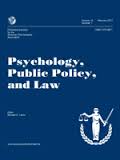Evaluators who did not consider psychological, medical and/or criminal records as part of a competency evaluation were more likely to opine incompetent defendants as restorable than those who did consider these records. This is the bottom line of a recently published article in Psychology, Public Policy, and Law. Below is a summary of the research and findings as well as a translation of this research into practice.
Featured Article | Psychology, Public Policy, and Law | 2013, Vol. 19, No. 4, 498-508
Factors Influencing 2,260 Opinions of Defendants’ Restorability to Adjudicative Competency
Author
Abstract
We examined 2,260 forensic assessments in which the evaluator opined that the defendant was incompetent to stand trial. In approximately one half of these evaluations (52%), the evaluator concluded that the defendant was likely to be restored to competency in the foreseeable future. This opinion was reached more frequently with defendants who were female, under the age of 60, suffering from an affective or psychotic disorder with previous psychiatric hospitalizations, and who were noncompliant with psychiatric medication at the time of the offense. Similarly, defendants were viewed as more likely to be restored to competency if the evaluation had been requested by the defense, the defendant was seen as not impaired on the capacity to understand legal proceedings element of the Dusky v. United States standard, the evaluator had a terminal degree of EdD and the defendant’s psychological, medical, and/or criminal records had not been obtained and considered as part of the forensic assessment. Using chi-square automated interaction detector analyses (CHAID; Kass, 1980), we found that psychiatric diagnosis was the most powerful variable in classifying opinions concerning the restorability of incompetent defendants. Defendants diagnosed with an affective or psychotic disorder were more likely to receive an opinion of likely/probable restoration than those defendants diagnosed with pervasive developmental, organic, substance-use, personality, or other disorders. These data suggest that the clinical condition of the defendant lies appropriately at the center of this process of predictive opinion formulation. The results also indicate that referral biases and/or crime-specific motivations for finding offenders restorable, often suggested as possible contaminants to this process, are not statistically significant in our large sample of forensic referrals.
Keywords
adjudicate competence, competency to stand trial, capacity to stand trial, fitness to stand trial, trial competency, forensic evaluation
Summary of the Research
Researchers examined opinions regarding competency to stand trial for 9,921 evaluations of adult criminal defendants conducted between 1990 and 2007 in the Commonwealth of Virginia. Of these, evaluators rendered an opinion regarding restorability in 2,260 cases. Statistical analyses of various factors—referral and evaluator characteristics, demographic characteristic, offense, diagnoses, and records reviewed—were conducted for these 2,260 opinions in an attempt to determine factors related to opinions regarding restorability of incompetent defendants.
Results of these analyses indicated a number of interesting outcomes. When opinions regarding restorability were examined with respect to the specific Dusky prong (understand or assist) implicated in the incompetency decision, defendants who did not demonstrate impaired understanding were more likely to be considered restorable.
When demographic variables were examined, men and defendants over the age of 60 were less likely to be considered restorable (whereas women and defendants younger than 60 years were more likely to be considered restorable). Race/ethnicity did not differentiate between those opined restorable and not restorable.
Defendants who were referred for competency evaluation by the defense were more likely to be considered restorable whereas those who were referred by the prosecution or the court were less likely to be considered restorable.
Defendants who had prior convictions were more likely to be opined restorable than those without prior convictions, but type of crime (violent or nonviolent) was not related to restorability.
Defendants with affective and psychotic disorders were most likely to be considered restorable whereas those with pervasive developmental disorders, Autism, or organic disorders were least likely to be considered restorable.
Defendants who were taking medication at the time of the offense were less likely to be considered restorable compared to those who were not taking medication at the time of offense.
Perhaps most interesting,
“If an evaluator received psychological, medical, and/or the defendant’s criminal records, he or she was less likely to give an opinion of probable restorability, as opposed to evaluators who did not receive these documents. There was a trend suggesting that when evaluators did not obtain the offense information, they were more likely to opine that the defendants were likely to be restored to competency. Reviewing the warrant, the reasons for the evaluation, and defendant and witness statements were not significant factors in evaluators’ opinions of restorability” (p. 503).
Translating Research into Practice
These results are consistent with the body of research that exists regarding evaluators’ opinions of the restorability of incompetent defendants. An important caveat is that this research base focuses on evaluator opinions regarding restorability and not on whether defendants are actually restored to competence. An important point developed in this research that has not been addressed in other research to date is the difference in opinions regarding restorability that results from the way in which the evaluation is conducted. That is, evaluators who considered collateral information, such as psychological, medical, and/or criminal records, were less likely to opine the defendant to be restorable. Current best practices for the evaluation of competence to stand trial indicate that collateral information sources are an important, if not required, data point to consider. Evaluators should be aware that the types of data that they consider, or fail to consider, in a competency evaluation can have a significant impact on the outcome of the evaluation. Every effort should be made to collect and consider relevant collateral or third party data sources in the evaluation of adjudicative competence. Neglecting to do so may have significant consequences for the evaluation outcome.
Other Interesting Tidbits for Researchers and Clinicians
Researchers will be interested in the statistical analyses used in this study. Chi-square automated interaction detector analyses (CHAID) was the primary means of examining these data. “CHAID explores the interaction of factors that contribute to restoration opinions by running a series of cross-tabulations and then incorporating them into a decision tree. This method of analyses selects the best predictor variable for the first ‘parent node’ and then repeats this process until a decision tree, comprised of ‘child nodes,’ is provided” (p. 501). In essence, these analyses provide information regarding the conceptual model used by forensic evaluators in making decisions. CHAID appears to be a useful way of examining decision making by evaluators and could be extended to decision making in other contexts.
Analyses also examined the discipline of the evaluator in relation to restorability opinions (no difference were found) as well as the terminal degree of the evaluator. Evaluators with an EdD were more likely to opine incompetent defendants as restorable whereas those with a PsyD or an MD were least likely to opine incompetent defendants as restorable.
Join the Discussion
As always, please join the discussion below if you have thoughts or comments to add!























